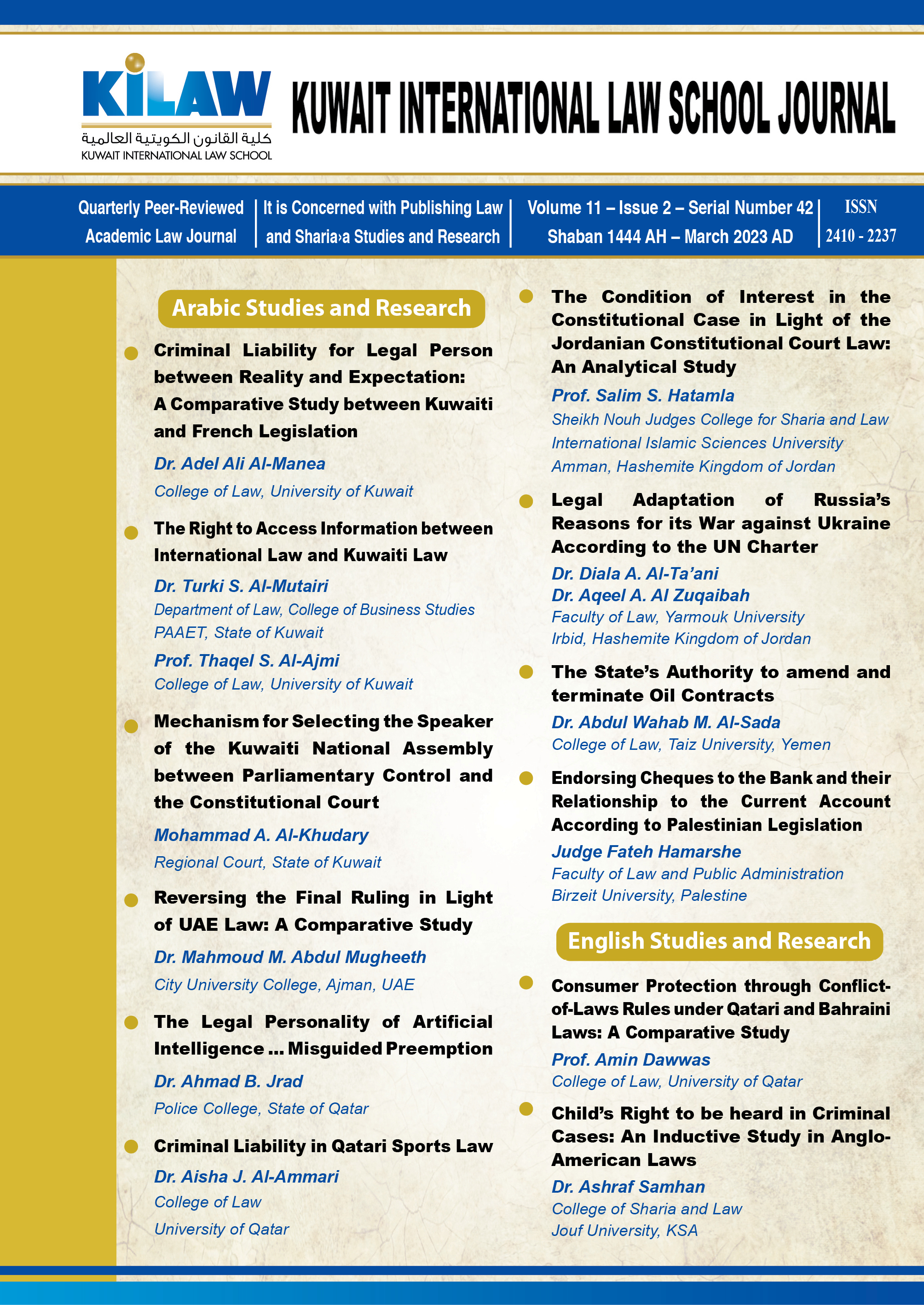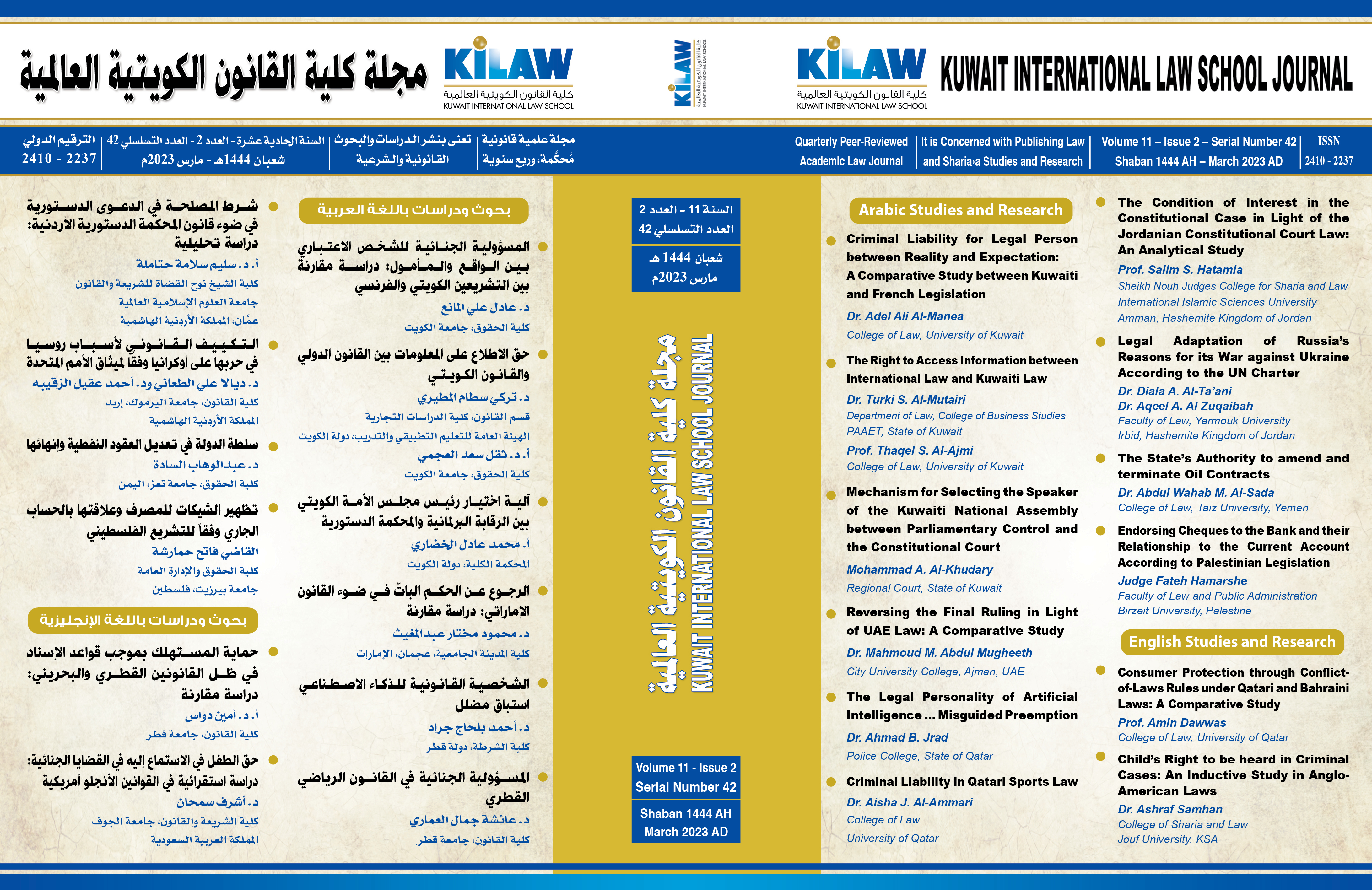| Volume 11 | shaban 1444 |
| Issue 42 | March 2023 |
| ISSN 24102237 |

Editorial
National Assembly Amendments to Articles (97) and (98) of its Internal Regulations and its Impact on Governance and Legislation Quality
By: Prof. Badria A. Al-Awadi
Editor-in-Chief
In a bid to expedite the legislative session of law proposals submitted by its members in the aim of addressing urgent societal issues and requirements that cannot tolerate delay, the National Assembly approved last November a proposed law amendment of Articles (97) and (98) of its internal regulations proposed by a number of its members stipulating that law proposals are referred directly to the relevant committees without going through the Legislative and Legal Affairs Committee as was previously the case. The amendment was issued in the Official Gazette (Kuwait Al-Youm) by Law No. 53 of 2022, in Issue No. 1613, the sixty-ninth year, on December 11, 2022.
National Assembly Amendments to Articles (97) and (98) of its Internal Regulations and its Impact on Governance and Legislation Quality
Chief-in-Editor Prof. Badria A. Al-Awadi
In a bid to expedite the legislative session of law proposals submitted by its members in the aim of addressing urgent societal issues and requirements that cannot tolerate delay, the National Assembly approved last November a proposed law amendment of Articles (97) and (98) of its internal regulations proposed by a number of its members stipulating that law proposals are referred directly to the relevant committees without going through the Legislative and Legal Affairs Committee as was previously the case. The amendment was issued in the Official Gazette (Kuwait Al-Youm) by Law No. 53 of 2022, in Issue No. 1613, the sixty-ninth year, on December 11, 2022.
The new text of Article (97) states that ‹‹Every member of the National Assembly has the right to propose laws, and the proposal must be formulated and as specific as possible, signed and accompanied by a statement of its reasons… The Speaker shall refer the proposed law to the specialized committee to study it in accordance with the provisions of the internal regulations of the National Assembly and its status. in the proper legal form…››
The explanatory memorandum of the law justified this amendment due to the passage of a long period (of sixty years) since the issuance of the Assembly’s internal regulations, during which many changes occurred in parliamentary work, which necessitated reconsidering the texts of these regulations and making appropriate amendments, referring to the large increase in the number of proposals for submitted laws, which requires a review of how to deal with them, whether they are related to referral or to consideration.
Thus, it is clear that the amendment mainly aims to speed up the pace of decision-making on law proposals, although this was not explicitly stated either in the amended text or in the explanatory memorandum, by excluding the station of the Legislative and Legal Affairs Committee, to which all law proposals were referred first for examination from the perspectives of constitutional, legal and drafting matters, then transfer the appropriate ones to the specialized committees. The sponsors and supporters of the amendment explained that the previous situation used to take a long time due to the large number of proposals and to the slow and sometimes arbitrary work of the committee, which prevents their proposals from reaching the Assembly’s agenda, which means that the aspirations and choices of the voters they represent are not fulfilled.
Despite the validity of the previous explanations and reasons, the exclusion of the Legislative and Legal Affairs Committee phase was not the right thing, and it is considered a retreat from a more effective approach in ensuring the integrity of legislation, and our argument for that rests on the following reasons and data:
– The committee consists of members who are elected by the deputies themselves, and although it often expresses the majority, its role is to study all submitted law proposals, voice an opinion on them, report on them, and then refer them to the assembly.
– The committee seeks the assistance of constitutional and legal experts, which would help it to quickly decide on draft laws and to ensure the soundness of decisions and recommendations regarding them.
– The committee is keen on the proper drafting of the legal proposals submitted thanks to the drafting experts and technicians it employs.
– The committee is familiar with submitted proposals and draft laws, giving it the experience and competence to deal with laws.
– Most parliaments in the world assign the task of deciding on law proposals to legislative committees first.
– Experience has proven after the exclusion of the Legislative Committee that the laws issued are tainted with many defects in wording and legislative and legal integrity, which expose them to invalidation in the Constitutional Court.
For this reason, much of constitutional jurisprudence – and we share this opinion – believes that this step was unsuccessful as it harmed the issue of the governance and quality of legislation and that it is more appropriate to abandon it and return things to their proper order so as to ensure that legislation is free of defects and of causes of invalidity.
Content
Arabic Studies and Research
Criminal Liability for Legal Person between Reality and Expectations: A Comparative Study between Kuwaiti and French Legislation
Dr. Adel Ali Al-Manea
Associate Professor of Criminal Law
College of Law, University of Kuwait
The Right to Access Information between International Law and Kuwaiti Law
Dr. Turki Sattam Al-Mutairi
Associate Professor of Public Law
Department of Law, College of Busimess Studies
PAAET, State of Kuwait
Prof. Thaqel Saad Al-Ajmi
Professor of Public International Law
Faculty of Law, University of Kuwait
Mechanism for Selecting the Speaker of the Kuwaiti National Assembly between Parliamentary Control and the Constitutional Court
Mohammad Adel Al-Khudary
Judge, Regional Court, State of Kuwait
Reversing the Final Ruling in Light of UAE Law: A Comparative Study
Dr. Mahmoud Mukhtar Abdul Mugheeth
Associate Professor of Civil Procedure Law
City University College, Ajman, UAE
The Legal Personality of Artificial Intelligence … Misguided Preemption
Dr. Ahmad Belhaj Jrad
Associate Professor of Civil Law
Police College, State of Qatar
Criminal Liability in Qatari Sports Law
Dr. Aisha Jamal Al-Ammari
Assistant Professor of Criminal Law
& Head of Public Law Department
College of Law, University of Qatar
The Condition of Interest in the Constitutional Case in Light of the Jordanian Constitutional Court Law: An Analytical Study
Prof. Salim Salama Hatamla
Professor of Public Law, Department of Comparative Law
Sheikh Nouh Judges College for Sharia and Law
International Islamic Sciences University
Amman, Hashemite Kingdom of Jordan
Legal Adaptation of Russia’s Reasons for its War against Ukraine According to the UN Charter
Dr. Diala Ali Al Ta’ani
Associate Professor of Public International Law
Faculty of Law, Yarmouk University, Irbid, Hashemite Kingdom of Jordan
Dr. Aqeel Ahmad Al Zuqaibah
Assistant Professor of Public International Law
Faculty of Law, Yarmouk University, Irbid, Hashemite Kingdom of Jordan
The State’s Authority to amend and terminate Oil Contracts
Dr. Abdul Wahab Mohammad Al-Sada
Assistant Professor, Department of Private International Law
College of Law, Taiz University, Yemen
Endorsing Cheques to the Bank and their Relationship to the Current Account According to Palestinian Legislation
Judge Fateh Hamarshe
Judge and Part-Time Lecturer
Faculty of Law and Public Administration
Birzeit University, Palestine
English Studies and Research
Consumer Protection through Conflict-of-Laws Rules under Qatari and Bahraini Laws: A Comparative Study
Prof. Amin Dawwas
Professor of Private Law
College of Law, University of Qatar
Child’s Right to be heard in Criminal Cases: An Inductive Study in Anglo-American Laws
Dr. Ashraf Samhan
Associate Professor of Criminal Law
College of Sharia and Law
Jouf University, KSA

